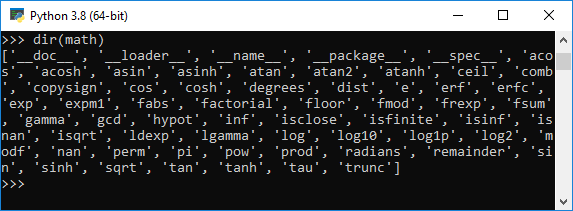As discussed in the python module chapter, the module is a file that will contain a set of functions, variables, classes, etc., to use in your applications.
Python has a set of built-in modules such as math, os, sys, etc., to use in any python script file. The built-in modules will load automatically whenever the interpreter starts, and these modules are available as a part of python libraries.
The built-in modules that are available in python interpreter written in C. To see the list of all available built-in modules, execute the help('modules') command in the python console as shown below.
>>> help('modules')
The above command will return all the available modules in the python interpreter.
__future__ _tkinter getpass sched
_abc _tracemalloc gettext secrets
_ast _warnings glob select
_asyncio _weakref gzip selectors
_bisect _weakrefset hashlib setuptools
_blake2 _winapi heapq shelve
_bootlocale _xxsubinterpreters hmac shlex
_bz2 abc html shutil
_codecs aifc http signal
_codecs_cn antigravity idlelib site
_codecs_hk argparse imaplib smtpd
_codecs_iso2022 array imghdr smtplib
_codecs_jp ast imp sndhdr
_codecs_kr asynchat importlib socket
_codecs_tw asyncio inspect socketserver
_collections asyncore io sqlite3
_collections_abc atexit ipaddress sre_compile
_compat_pickle audioop itertools sre_constants
_compression base64 json sre_parse
_contextvars bdb keyword ssl
_csv binascii lib2to3 stat
_ctypes binhex linecache statistics
_ctypes_test bisect locale string
_datetime builtins logging stringprep
_decimal bz2 lzma struct
_dummy_thread cProfile mailbox subprocess
_elementtree calendar mailcap sunau
_functools cgi marshal symbol
_hashlib cgitb math symtable
_heapq chunk mimetypes sys
_imp cmath mmap sysconfig
_io cmd modulefinder tabnanny
_json code msilib tarfile
_locale codecs msvcrt telnetlib
_lsprof codeop multiprocessing tempfile
_lzma collections netrc test
_markupbase colorsys nntplib textwrap
_md5 compileall nt this
_msi concurrent ntpath threading
_multibytecodec configparser nturl2path time
_multiprocessing contextlib numbers timeit
_opcode contextvars opcode tkinter
_operator copy operator token
_osx_support copyreg optparse tokenize
_overlapped crypt os trace
_pickle csv parser traceback
_py_abc ctypes pathlib tracemalloc
_pydecimal curses pdb tty
_pyio dataclasses pickle turtle
_queue datetime pickletools turtledemo
_random dbm pip types
_sha1 decimal pipes typing
_sha256 difflib pkg_resources unicodedata
_sha3 dis pkgutil unittest
_sha512 distutils platform urllib
_signal doctest plistlib uu
_sitebuiltins dummy_threading poplib uuid
_socket easy_install posixpath venv
_sqlite3 email pprint warnings
_sre encodings profile wave
_ssl ensurepip pstats weakref
_stat enum pty webbrowser
_statistics errno py_compile winreg
_string faulthandler pyclbr winsound
_strptime filecmp pydoc wsgiref
_struct fileinput pydoc_data xdrlib
_symtable fnmatch pyexpat xml
_testbuffer formatter queue xmlrpc
_testcapi fractions quopri xxsubtype
_testconsole ftplib random zipapp
_testimportmultiple functools re zipfile
_testmultiphase gc reprlib zipimport
_thread genericpath rlcompleter zlib
_threading_local getopt runpy
Get Help on Modules
To get the details about a particular built-in module, you can use the help() method. For example, after importing the math module, you can call help(math) to get the math module details in python.
Following is an example of getting the details about the math module in python.
>>> import math
>>> help(math)
It will return the detailed info about the math module like as shown below.

If the information is more than one page, it will display -- More -- as shown in the image, if you want to see more info, press Enter.
You can also use the built-in dir() function to get the particular module's available names and attributes.
>>> dir(math)
The above statement will return the result as shown below.

We will learn more about built-in modules in the next chapters.